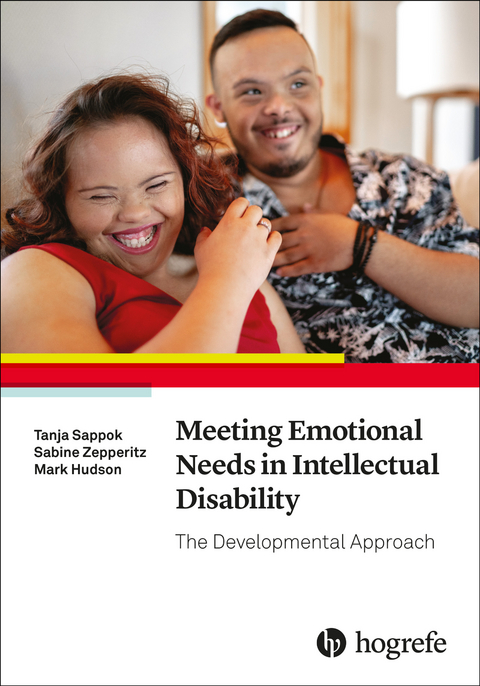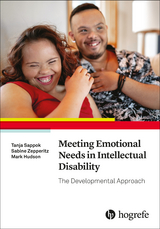Meeting Emotional Needs in Intellectual Disability
Hogrefe Publishing (Verlag)
978-0-88937-589-5 (ISBN)
Using a developmental perspective, the authors offer a new, integrated model for supporting people with intellectual disability
(ID). This concept builds upon recent advances in attachment informed approaches, by drawing upon a broader understanding of the social, emotional, and cognitive competencies of people with ID, which is grounded in developmental neuroscience and
psychology. The book explores in detail how challenging behaviour and mental health difficulties in people with ID arise when their basic emotional needs are not being met by those in the environment. Using individually tailored interventions, which
complement existing models of care, practitioners can help to facilitate maturational processes and reduce behaviour that is
challenging to others. As a result, the "fit" of a person within his or her individual environment can be improved. Case examples
throughout the book illuminate how this approach works by targeting interventions towards the person's stage of emotional
development.
This book will be of interest to a wide range of professionals working with people with ID, including: clinical psychologists,
psychiatrists, occupational therapists, learning disability nurses, speech and language therapists, and teachers in special education settings, as well as parents and caregivers.
Tanja Sappok, MD, heads the Berlin Treatment Center for Mental Health in Developmental Disabilities at the Ev. Krankenhaus Koenigin Elisabeth Herzberge as chief physician. Clinical and scientific fields of work include autism spectrum disorders, emotional dvelopment disorders, behavioural disorders, and dementia. She is president of the European Association for Mental Health in Intellectual Disability (EAMHID) and vice president of the German Society for Mental Health with Mental Disability (DGSGB) and teaches psychiatry at the medical faculty of the Charite, Berlin. Sabine Zepperitz, Dipl.-pad, is a systemic therapist and trauma consultant and leads pedagogical staff at the Berlin Treatment Center for Mental Health in Developmental Disorders at the Ev. Krankenhaus Koenigin Elisabeth Herzberge. She works primarily with people with moderate to severe intellectual disabilities and trains facilitators for SED-S diagnostics and counselling in a series of workshops. She has been offering advanced training for caregivers and team consultations in the support for people with disabilities for several years. Dr Mark Hudson, DClinPsy, is a practising clinical psychologist and assistant professor of clinical psychology at the University of Nottingham, UK, where he carries out teaching and research. He works in both a community child and adolescent mental health service and a specialist community team for children with ID. Dr Hudson currently co-leads the Elizabeth Newson Centre, providing specialist assessments to families where a child has developmental difficulties.
Preface to the English Edition
1 Emotional Development: An Introduction
1.1 Emotion and Cognition in Dialogue
1.2 Conceptualisation of Emotional Development
1.3 The Development of the Emotional Brain
1.4 The Neuroanatomy of the Emotional Brain
1.5 Developmental Theories and Developmental
Tasks
1.6 The Developmental Approach and Adulthood
2 Phases of Emotional Development
2.1 SED-S Phase 1:
Adaptation (Reference Age: 0-6 Months) -
SYMBIOSIS
2.2 SED-S Phase 2:
Socialisation (Reference Age: 7-18 Months) -
SAFETY
2.3 SED-S Phase 3:
First Individuation (Reference Age: 19-36
Months) - AUTONOMY
2.4 SED-S Phase 4:
Identification (Reference Age: 4th-7th Years of
Life) - FORMING SELF
2.5 SED-S Phase 5:
Reality Awareness (Reference Age: 8th-12th
Years of Life) - SELF-DIFFERENTIATING
2.6 SED-S Phase 6:
Social Individuation (Reference Age: 13th-17th
Years of Life) - IDENTITY
3 The Practical Application of the SED-S
3.1 The Scale of Emotional Development - Short:
SED-S
3.2 Assessing Emotional Development With the
SED-S
3.3 Analysis of the SED-S
3.4 The SED-S Assessment and the Derivation of
Therapeutic
Interventions in the Case Study
3.5 Other Methods of Developmental Diagnostics
4 SED-S: The Milestones of Emotional
Development
4.1 Domain 1: Relating to Their Own Body
4.2 Domain 2: Relating to Significant Others
4.3 Domain 3: Dealing With Change - Object
Permanence
4.4 Domain 4: Differentiating Emotions
4.5 Domain 5: Relating to Peers
4.6 Domain 6: Engaging With the Material World
4.7 Domain 7: Communicating With Others
4.8 Domain 8: Regulating Affect
5 Challenging Behaviour
5.1 The Stage of Emotional Development as the Key
to Understanding Challenging Behaviour
5.2 Emotional Development and Challenging Behaviour:
A Case Study
5.3 Behavioural Syndromes According to the Level
of ED
6 Mental Health Problems
6.1 The Importance of Emotional Development for
the Development of Psychological Distress
6.2 Psychiatric Diagnoses as a Function of the
Level of Emotional Development
6.3 Mental Disorders Influencing the Stage of
Emotional
Development
6.4 The Dilemma of Categorisation
7 The Implementation of the Emotional Development
Approach in Clinical Practice
7.1 General Aspects
7.2 Special Features in Childhood and Adolescence
8 Characteristic Examples of Care and Treatment
Approaches in the Individual SED-S Phases
8.1 Case Study for SED-S Phase 1
8.2 Case Study for SED-S Phase 2
8.3 Case Study for SED-S Phase 3
8.4 Case Study for SED-S Phase 4
8.5 Case Study for SED-S Phase 5
8.6 Case Study for SED-S Phase 6
9 Therapeutic Interventions
10 Opportunities and Possibilities for
Development-Based, Multi-Disciplinary Case
Conferences
Summary
Concluding Observation
| Erscheinungsdatum | 31.08.2021 |
|---|---|
| Verlagsort | Toronto |
| Sprache | englisch |
| Maße | 178 x 254 mm |
| Themenwelt | Geisteswissenschaften ► Psychologie ► Entwicklungspsychologie |
| Geisteswissenschaften ► Psychologie ► Klinische Psychologie | |
| Geisteswissenschaften ► Psychologie ► Persönlichkeitsstörungen | |
| ISBN-10 | 0-88937-589-5 / 0889375895 |
| ISBN-13 | 978-0-88937-589-5 / 9780889375895 |
| Zustand | Neuware |
| Haben Sie eine Frage zum Produkt? |
aus dem Bereich




